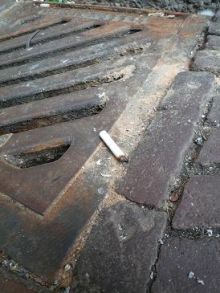Begging for the Bio-butt
(Latest update: June 2010)
4.200 hazardous substances: who’ll stamp out the cigarette butt?
 Apart from being a stinky eyesore, cig filter butts are toxic plastic waste. Few are smokers who realize the damage they’re doing when flicking that wee bugger away. Fewer still the policy makers hell-bent on ending this unnoticed threat to birds and marine life. Some relief could come from biodegradable filters.
Apart from being a stinky eyesore, cig filter butts are toxic plastic waste. Few are smokers who realize the damage they’re doing when flicking that wee bugger away. Fewer still the policy makers hell-bent on ending this unnoticed threat to birds and marine life. Some relief could come from biodegradable filters.
But(t)….
A cigarette is sexy. Not so the sticky butt. Even for scientists, thus far, no glory was attached to such seemingly tiny ‘research topic’. But that’s in the past. Cause, as an environmental hazard, cig filters are turning out quite big.
The number of chemical residues in any butt is staggering. Some 4.200, according to The Chemical Components of Tobacco and Tobacco Smoke, a recent brick sized book by Alan Rodgman, reviewing all substances in smoked butts. Many are eco-toxic to some degree.
Non-degradable
What’s more: almost all cigarettes on the (western) market today are filter brands. That makes the butts even more nasty . For, contrary to what smokers like to believe, a filter is not a biodegradable paper waste flimsy. Filters are made of plastic, cellulose(di)acetate to be more precise. Although derived from wood chips, it is non-biodegradable.
The filter became popular under public pressure. Confronted with the detrimental health effects of cigarettes, manufacturers designed filters to capture some of the cancer causing compounds from the burned tobacco tar. But it was a deceptive move, as it enabled tobacco marketeers to allay people’s fears of smoking, thus encouraging them to smoke and inhale even more.
The net result was: no reduction of average tar intake per person and a staggering 4.500 billion poisonous butts in parks, waterways and oceans worldwide each year.
Fish die
The actual ecotoxicity to water organisms is still a matter of debate. Some modeling studies (Warne et. al.) suggest that the damage in open water ecosystems is really small. But in confined environments just one butt appears to be deadly. In a 1 liter bowl fish were even found to die from unsmoked filter material itself (Gersberg et. al.)!
Another worrying matter is ingestion of plastic items, such as filter butts, so deadly to birds and marine life (See: http://www.chrisjordan.com/current_set2.phpid=11). A biodegradable filter might help. Not against the chemicals leaking from cig butts into the environment, but against the unnoticed plastic waste of the butts themselves.
Recent public attention to the vast ‘plastic soup’ patches of polluted ocean has to some degree rekindled the discussion about cig butt waste as well.
But so far governments never push for it, afraid as they are to lose the income from tobacco taxes. They stick with supporting beach clean-up actions and the like – as do (surprisingly) environmental groups and the industry.
Biofilters
‘Big tobacco’ has failed to come up with a degradable filter. Sure, they tried. In the hey days of environmental activism, when the U.S. government threatened to end the usual landfilling of non-degradable waste, manufacturers scrambled to test a series of ‘green’ cigarettes, ranging from organic tobacco to ecofilters.
Some actually got top scores with consumers. But as the green storm abated, so did the innovative zest. By 2000 a combined effort by the industry’s common organization Coresta was shelved. The manufacturers couldn’t find an alternative that consumers liked, they claimed.
The only project still on the market seems to be the one announced in 2005 by the British/German bio-plastics producer Stanelco/Biotec. Although that patent, too, has been put in low gear, some quiet initiatives in Canada suggest that Stanelco has not quite abandoned the idea…
Photo: © Michel Robles
Martial Art

Once they were bullets, pistols or grenades. Now under the deft hands of Mozambique’s possibly most famous sculptor Goncalo Mabunda they have been transformed into Art.
Recycling AK-47's and other arms from the one-time civil war has become the trade mark of Mabunda and a couple of his fellow artists. I saw some of the results in a small B&B in Antwerp. But even the British Museum and the Bill Clinton Foundation acquired pieces from the 'Arms into Art' programme. Read more…
Photo: © Michel Robles
High on FSC

Ten years ago the Netherlands were an admired environmental pioneer nation. Nowadays, due to a shortsighted neoliberal policy we are almost tail-end Charley within the European Union. Belgium, on the other hand, is a real runner-up. Last December (2010) the Flemish Leukenheide distillery presented Dennenknopje (Pine Bud). Dennenknopje is the world’s very first jenever (traditionally a truly Dutch strong drink), made from a Forest Stewardship Council (FSC) labeled wood product. The gin-like softbooze is distilled from pine cones from the Pinus silvestris. The pines grow in Flanders’ vastest, FSC certified forest region Bosland. A local high from an okay forest. Innovation can be anywhere.…
Questioning Plastiki pride
The newly designed cradle-to-cradle catamaran Plastiki has recently arrived is Sidney after a publicity voyage from California across the Pacific Ocean. The designers claim extreme recyclability. But, contrary to earlier announcements, the ship will not be up-cycled now that it has reached its destination. The builders say they've become too attached to their newborn baby. Of course, the vessel can be a showcase for years to come. But, hey, isn't this kind of attachment of people to their achievements precisely the reason why our earth is becoming such a cluttered place? www.theplastiki.com

Sweet C2C
Cradle-to-cradle handmade beauty: go haunt the town's antique and recycle shops and flea markets for a bunch of elegant (or maybe you prefer funny or modern design) plates, saucers and wine glasses. Wash them well, sand the glasses' brims lightly and glue things together with strong porcelain glue. Any shape, size and design you fancy, will do.


Lo and behold: you have now created your own home grown bonbonnière! For sweets, cookies, fruit - or sandwiches if you like. Ladies love'em! Dozens were sold in a fashion shop in my home town. Enjoy more...

Photos: © Michel Robles
Links
Novio Design Webdesign
